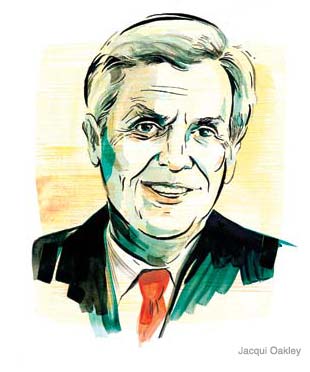
In 1967, in exchange for free graduate-school tuition, Bill Kling agreed to help Minnesota’s St. John’s University start a radio station. Today that effort’s descendent, Minnesota Public Radio, operates a forty-four-station network heard by more than nine hundred thousand people each week—the largest audience of any regional public radio network. After forty-four years as MPR’s first and only CEO, Kling stepped down in June, leaving a legacy of aggressive expansion; he launched American Public Media, the nation’s second largest public-radio distributor and programming producer, and was a founding director of the largest, NPR. Joel Meares spoke to Kling in April about the role and future of public media. A longer version of their conversation can be found here.
You say there’s a crisis in the media, and that it presents an opportunity for public media.
We see two key trends: the polarization of commercial media, and in newspapers, this unfortunate continuing decline in revenues. So some kind of strong nonprofit public journalism that serves local communities needs to be available. In many communities, public broadcasting is probably going to be the default alternative, and it’s not ready.
How so?
Its governing structure isn’t ready. For instance, there was a grant made to put two public radio reporters in every state capital. It sounds like a good idea except that some of those reporters were working for state institutions—like universities—while trying to report on the state government. It isn’t the best circumstance to have the governor able to say to the chairman of the board of regents, “I want that story killed,” or “I want the notes.”
You’ve spoken about a lot more than two reporters—you say mid-sized cities need one hundred reporters and editors in public radio newsrooms. But it took decades for MPR to get to thirty-five reporters and editors.
The critical timeframe is to be there when there’s no one there to do the job and no one to do the job well. Let’s say the tablet will save the newspaper, they make it through the digital transition, they stop printing, save the distribution costs, save the printing costs, and they get a business model that works. So far they haven’t.
The moment you’re talking about is imminent. I don’t see how you reach the goal.
I’m disappointed we didn’t see it sooner. It was like climate change, there were early signs and a lot of people missed them. I wish we had set up a plan with the Corporation for Public Broadcasting. I wish I’d been able to go to Congress and say to them, “I don’t care what party you are affiliated with, getting a strong, independent, factual news service ready to serve this country is probably as important as anything you could do.” And getting them to fund it at a level that is appropriate—not $150 million a year, but something closer to a BBC.
Why hasn’t the US been able to achieve what the Brits have in public media?
It hasn’t had a champion. The champion could be a political or a lay leader. Our federal funding in public radio hasn’t changed, in real dollars, since 1980.
The American State Department put an unknown—but I suspect significant—amount of money into the BBC to help it deal with social media in Libya and Egypt. We seem to be willing to fund getting out the message in the name of democracy throughout the world, but we have forgotten to look at what that means in our own country. We have taken for granted that democracy is a solid ethic of the American people. It won’t be if we don’t tend to it.
Joel Meares is a former CJR assistant editor.
